 2018 was a bit of a year, really. There was a strong showing in the first few months of the year and it felt like the early albums would be difficult to beat. Maybe it was a self-fulfilling prophecy or the fact that, for one reason or another, I wasn’t able to review too many albums in the latter part of the year but the early albums were very difficult to beat. I’m only featuring albums that I reviewed here, so great pieces of work like the magnificent Stone Foundation album “Everybody, Anyone” doesn’t get a mention. Oops, it just did. Anyway, as always in no particular order, here are my five favourite albums of the year.
2018 was a bit of a year, really. There was a strong showing in the first few months of the year and it felt like the early albums would be difficult to beat. Maybe it was a self-fulfilling prophecy or the fact that, for one reason or another, I wasn’t able to review too many albums in the latter part of the year but the early albums were very difficult to beat. I’m only featuring albums that I reviewed here, so great pieces of work like the magnificent Stone Foundation album “Everybody, Anyone” doesn’t get a mention. Oops, it just did. Anyway, as always in no particular order, here are my five favourite albums of the year.
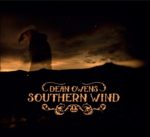 “Southern Wind” – Dean Owens & Will Kimbrough
“Southern Wind” – Dean Owens & Will Kimbrough
I’ve been a fan of Dean Owens since my introduction to “New York Hummingbird” six years ago. Dean’s a consistently great performer whose songs cleverly combine universal themes like love and loss with a particularly Scottish outlook. Over the last few years he’s been increasingly involved in collaborations (with Amy Geddes as Redwood Mountain and the upcoming Buffalo Blood album with Neilson Hubbard and Joshua Britt) and “Southern Wind” was a joint project with the superb and in-demand guitarist Will Kimbrough. The album is a classic; there’s no filler and lots of killer and you can clearly hear the influence of the wonderful Ronnie Lane, particularly in “Last Song”. I wasn’t going to single any particular song out, so how come that just happened. It’s a meeting in the mid-Atlantic between Leith and Nashville and it’s a Thing of Beauty.
 “Psychopastoral” – Phil Burdett
“Psychopastoral” – Phil Burdett
Coincidentally, I first met Phil Burdett on the same night I met Dean for the first time (this stuff isn’t just thrown together, you know) and they’ve both had very different journeys since then. If I had to pick one word for Phil’s attitude to his music, it’s uncompromising, and I mean that in a very, very good way. His back catalogue is all worth checking out, but his latest project “Psychopastoral” is something else. It’s a song cycle which tells the story of the journey home spread out over 24 hours. Sounds simple? This Phil Burdett. The songs are linked by spoken-word interludes and (courtesy of Lyndon ‘Songdog’ Morgan) and musical fragments created mainly by Senor ‘Al’ Franklinos. I know, it sounds like it could be a bit pretentious, as I said, this is Phil Burdett; it works perfectly. And Phil’s gone one step further than Pink Floyd by making the whole project one massive track nearly an hour long to force listeners to hear the project the way it was intended to be heard. Didn’t think I’d ever write a sentence with Phil Burdett and Pink Floyd in it.
 “Out from Under” – Michael McDermott
“Out from Under” – Michael McDermott
We can link this back to Dean Owens as well, because Will Kimbrough plays on this, as he does on a lot of Michael’s recent material. Told you he was in demand. The title song is big in an E Street Band style and, let’s face it, Michael will always get those Springsteen/Dylan comparisons and for all the right reasons. He’s a superb songwriter who understands the American songbook and its highways and byways and isn’t afraid to take a trip down any one of them. The album shifts seamlessly from the pathos of “This World Will Break Your Heart” to the joyful Motown exuberance of “Rubber Band Ring”. I said back in May that I hadn’t heard a better album this year and I stand by that now.
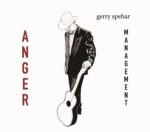 “Anger Management” – Gerry Spehar
“Anger Management” – Gerry Spehar
I loved Gerry Spehar’s previous album “I hold Gravity”. He’s a natural songwriter with a gift for a telling image. So just combine that gift with an exploration of the state of modern America following the election of Kurious Oranj. It’s political in less direct ways as well; “Bitch Heaven” digs into the story of Woody Guthrie’s campaign against Trump Senior and the Beach Haven property, while “Son of an Immigrant” double-underlines the blindingly obvious truth that the vast majority of Americans are immigrants if you go back far enough, including the current occupant of the White House. It’s an angry album, but Gerry is managing the anger by diverting it into creative channels. This is an important album and we should all listen to it.
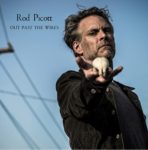 “Out Past the Wires” – Rod Picott
“Out Past the Wires” – Rod Picott
OK, quantity isn’t everything, but Rod Picott defied the current trend for shorter albums and EPs by releasing a double album (twenty-two songs in total). If you have the material and it’s good enough, get it out there. It’s good enough, it’s more than good enough. Will Kimbrough plays on it and also Neilson Hubbard (notice a theme here) but it’s not just about the playing arrangements, it’s also about the stories and that’s what Rod Picott is really good at. In fact, the stories are so important that Rod’s also publishing a book following the lives of some of the characters appearing in the songs and that should really be worth reading.
 Sure, the melodies and the arrangements are important; they must be if Neilson Hubbard and Will Kimbrough are involved, but with Rod Picott, the stories are always front and centre. “Out Past the Wires” is no exception, in fact it takes the narratives a step further. In addition to the album, Rod’s also publishing a book exploring the stories of some of the characters that appear on the album. Listen to the beautifully-crafted vignettes studded through the twenty-two songs (that’s right twenty-two songs; hope you brought a packed lunch for this one) and you feel that you’re just scratching the surface of their lives. The ageing racer in “Primer Gray”, the teen queen in “Hard Luck Baby”, the struggling musician in “Straight Job” and the labourer in “Store Bought”; you really want to know the back story, or where they move on to outside this particular moment. Listen to the album(s) and it all makes perfect sense.
Sure, the melodies and the arrangements are important; they must be if Neilson Hubbard and Will Kimbrough are involved, but with Rod Picott, the stories are always front and centre. “Out Past the Wires” is no exception, in fact it takes the narratives a step further. In addition to the album, Rod’s also publishing a book exploring the stories of some of the characters that appear on the album. Listen to the beautifully-crafted vignettes studded through the twenty-two songs (that’s right twenty-two songs; hope you brought a packed lunch for this one) and you feel that you’re just scratching the surface of their lives. The ageing racer in “Primer Gray”, the teen queen in “Hard Luck Baby”, the struggling musician in “Straight Job” and the labourer in “Store Bought”; you really want to know the back story, or where they move on to outside this particular moment. Listen to the album(s) and it all makes perfect sense.
Credit where it’s due to the other musicians on the album as well (Lex Price, Evan Hutchings and Kris Donegan) for creating settings that allow the songs to sparkle and shine, whether they’re sprinkled with underplayed atmospherics or a full-on, full-band workout. Whether the backing is a gently finger-picked acoustic, intertwined electric guitars, Lennonesque harmonica or a brooding rock feel with heavily-reverbed guitar. And then there’s Rod Picott’s voice, weaving its raw fibres through the fabric of the songs to conjure up passion, pain and even aspiration. He even manages to ease back to mellow with a touch of falsetto on “Blanket of Stars”.
At a time when ten-song albums are becoming increasingly common and EP or double EP is rearing its ugly head, it’s an utterly audacious move to release a double album, but it works. The standard of the songs is uniformly high across he two discs, but I’m going to hit you with a few that caught my personal sweet spot. “Primer Gray” evokes “Nebraska”/”The River” era Springsteen with the battered car symbolising the central character, “Hard Luck Baby” spins the downward spiral from teen beauty into drudgery and “The Shape of You” is a lovely poetic take on the void left in a life when a relationship ends. Listen for yourself; the choice is huge and I won’t be offended if you disagree with my choices.
“Out Past the Wires” is released on Friday February 16th on Welding Rod Records (CD, LP or download).
If you want to see Rod live, he’s touring Europe and the UK from March.
Here’s a little taster for you:
We reviewed Rod Picott as part of a great bill at Green Note this year and he was superb. We were mightily chuffed when he agreed to chip in to the 2016 High Fives with his five favourite novels from 2016.
 “Barkskins” – Annie Proulx
“Barkskins” – Annie Proulx
“Barkskins” is a roaring firestorm of a novel that tears through decades over its 700-plus pages. There are so many characters the book contains two family trees in order for the reader to stay on course. Proulx’s writing is poetic, expansive and intimate simultaneously. Essentially the story of the North American lumber trade from pre-colonial America through to the industrial revolution, “Barkskins” stands as an allegory to the destructive nature of man. The characters enter the novel, wildly tear across the pages and give way to the next generation in this amazing piece of work.
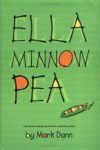 “Ella Minnow Pea” – Mark Dunn
“Ella Minnow Pea” – Mark Dunn
“Ella Minnow Pea” is a curiously odd political satire written in the form of letters between characters in the fictional island town of Nollop. This strange novel is short, punchy and darkly funny as the letters trace the totalitarian nature of the local government and its banned use of particular letters as they fall from a revered local memorial statue. This short novel is a marvel of invention and imagination.
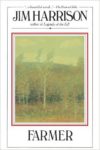 Farmer – Jim Harrison
Farmer – Jim Harrison
“Farmer” is a quiet marvel of a novel. Its protagonist is a rural Michigan teacher caught between two lovers – one, a far too young nubile beauty and the other his lifelong friend and confidant. This description doesn’t come close to capturing the tortured beauty of the protagonist’s journey. Harrison is a poet of a novelist, both literally and figuratively, and “Farmer” is an eloquent telling of the complications inherent in life itself – no matter how simple it appears at its surface.
 “Angela’s Ashes” – Frank McCourt
“Angela’s Ashes” – Frank McCourt
I’m always suspicious of a read that receives as much praise as McCourt’s “Angela’s Ashes”. It’s the iconoclast in me. This novel, however, is stunning. Written in the voice of McCourt’s own poverty-riven childhood, the novel crawls slowly forward across his youth from pain to pain. The mainstays are familiar; the drunken father, driving poverty, the unforgiving judgement of the church and the mother trying against odds to hold the entire mess together as a home. “Angela’s Ashes” is a stunning work worthy of its Pulitzer.
 “The Ancient Minstrel”– Jim Harrison
“The Ancient Minstrel”– Jim Harrison
Three compact novellas make “The Ancient Minstrel”. I can’t think of anyone aside from Hemingway who writes about the human condition in contrast to nature as effortlessly and effectively as Jim Harrison. That comparison sounds trite and easy but Jim Harrison has the force of a hurricane in his language. These three novellas are brilliant, ruthless, compassionate and brimming with both melancholy and life. Harrison was a master. The best 45 minutes I spent in 2016 was watching Harrison reading his poetry on a YouTube video from a few years back. What a brilliant, funny, unique writer we lost this year in Jim Harrison.
 After reviewing Rod Picott’s seventh album, “Fortune”, I discovered that he was playing Green Note as part of the run-up to his Celtic Connections show with Kimmie Rhodes on January 25th. It was late notice, and the gig was sold out, but somehow I just managed to squeeze in and I’m really pleased that I did. I have a huge admiration for these artists, like Rod Picott, who travel from town to town and bare their souls on stage with only a guitar for protection. I particularly admire American artists who tour this way in the UK, where it’s sometimes impossible to tell if the audience like you or not.
After reviewing Rod Picott’s seventh album, “Fortune”, I discovered that he was playing Green Note as part of the run-up to his Celtic Connections show with Kimmie Rhodes on January 25th. It was late notice, and the gig was sold out, but somehow I just managed to squeeze in and I’m really pleased that I did. I have a huge admiration for these artists, like Rod Picott, who travel from town to town and bare their souls on stage with only a guitar for protection. I particularly admire American artists who tour this way in the UK, where it’s sometimes impossible to tell if the audience like you or not.
Slipping on to the stage unannounced, he set out the plan of action for the night; a bunch of songs from “Fortune” to open up with, then some older songs and maybe a few requests. He had a setlist prepared, but there was a suspicion that it wasn’t set in stone; it wasn’t. After the opening “Maybe That’s What it Takes” and “Elbow Grease”, it was obvious that the set would unfold in its own way regardless of any planning.
Rod’s economical (sometimes laconic) lyrical style and his powerfully emotional vocals work perfectly in this room, but his secret weapon is his engaging and self-deprecating manner as he spins out anecdotes between songs. Some are amusing, some are laugh-out-loud and some are poetic (he sums up perfectly the elemental nature of Howling Wolf with the words ‘he looks like he’s the weather’), but they all help to create an intimacy between the audience and performer.
There are no half measures with Rod Picott; his songs are intense and he gives full value when he delivers them live, veins bulging and sinews straining as he wrings the maximum emotion out of each song. It’s sometimes hard to reconcile the laid-back raconteur and impassioned troubadour, but he makes the contrast work for him, gradually building a rapport with a fairly reserved Green Note audience.
There’s a selection of material from right across Rod’s career and the highlights include the rocking “65 Falcon”, “410”, “Welding Burns” and “Mobile Home” (which includes a Bowie reference in the lyrics). From the new album, the menacing “Uncle John” stands out alongside “Until I’m Satisfied”, which prompts a confession that the chord progression it’s based on is the same as the Eddie Cooley and Otis Blackwell classic, “Fever”. Each song is a perfect little story of blue collar delivered with power and passion; you can’t really ask for more than that.
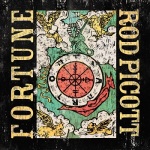 I think we need to introduce a new way of evaluating Country and Americana albums. The five star system’s all very well but I think we need another measure. I’m thinking of something like the Kimbrough Count; if Will Kimbrough plays on the album then it’s worth listening to. It certainly worked last year with his appearances on albums by Dean Owens and Sam Lewis, and he shows up again here on Rod Picott’s seventh album “Fortune”, but this is a very different proposition to the albums by either of those artists.
I think we need to introduce a new way of evaluating Country and Americana albums. The five star system’s all very well but I think we need another measure. I’m thinking of something like the Kimbrough Count; if Will Kimbrough plays on the album then it’s worth listening to. It certainly worked last year with his appearances on albums by Dean Owens and Sam Lewis, and he shows up again here on Rod Picott’s seventh album “Fortune”, but this is a very different proposition to the albums by either of those artists.
Rod Picott’s songs are intensely personal, zooming in on the lives of ordinary people (Rod included) and everyday events, and delivered in a gruff baritone that often sounds on the point of cracking, but never actually does. More often than not, he performs with just his own acoustic guitar for backing, but, on “Fortune”, he’s added a smattering of musicians including Will Kimbrough and Neilson Hubbard to create a sound that’s still sparse, stark and sometimes downright menacing and intimidating. It’s still a fairly minimal soundscape but it reinforces the powerful lyrics which are poetic but never overblown.
“Uncle John” is slightly untypical in that it deals mainly with family and society rather than personal matters, but the instrumentation is unsettling with detuned guitar, clipped notes, harmonics, heavy reverb and a sound somewhere between Dick Dale and Link Wray all underpinning a story of an outsider woodsman who pays the ultimate price for stepping outside society. The two lines ‘Drinks his beer from a can cause bottles break, Nine fingers from one mistake’ paint a graphic and economic picture of the lifestyle and its dangers, while the closing lines (along with the chorus) imply his death without actually making the statement.
The themes of the songs are mainly personal (although “Jeremiah” is written from the point of view of a woman hearing about the death of a soldier she loved), but it’s the moments when Rod steps back from dealing with raw emotion to singing about more general themes, particularly “Uncle John” and the moodily magnificent “Drunken Barber’s Hand” that the album really starts to soar. The album’s full of powerful, gut-wrenching songs that evoke the spirit of heartland America with imagery and playing that are equally powerful and simple. 2016’s looking good already.
“Fortune” is released in the UK on Friday January 15th on Welding Rod Records.


